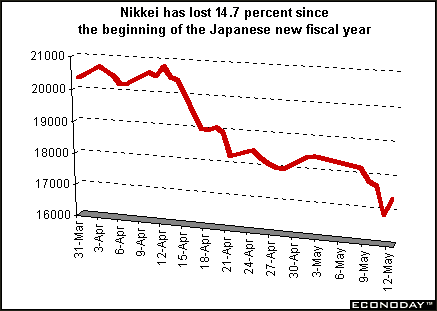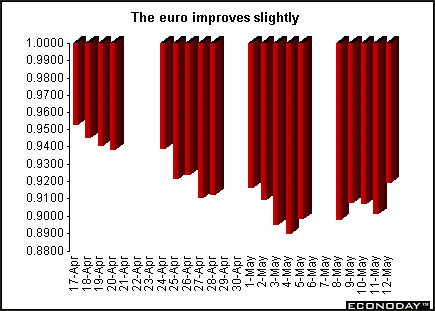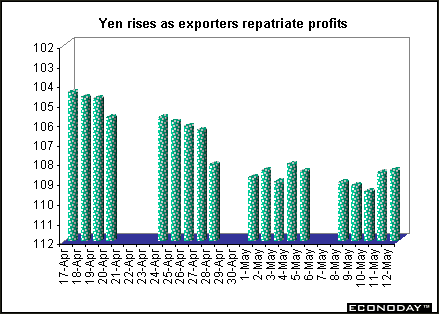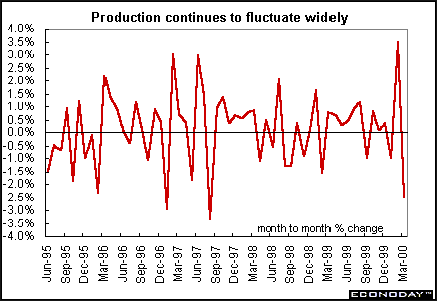| Previous Articles |
|
The
FOMC looms
Britain and Europe
For the FTSE 100, help on Thursday and Friday came from lower than expected U.S. retail sales and a relatively benign producer price index report. Rising U.S. markets spurred overseas markets to overcome some of their inflation and interest rate fears and put a positive spin on the weeks' close. Overall, London markets were cautious as investors digested the Bank of England's Inflation Report and looked forward to the U.S. Federal Reserve's crucial interest rate decision next week. Another factor that helped was renewed weakness for the pound sterling. Sterling fell below $1.50 for the first time in four years, and remained below that level for a short period of time. The weakness followed the Inflation Report, which appeared to suggest that UK rates could be approaching the top of the current cycle. The DAX and CAC, despite positive closes on Thursday and Friday, were not able to recoup losses earlier in the week. The DAX fell a hefty 261.54 points or 3.47 percent to end the week at 7269.28. The CAC lost 96.49 points or 1.47 percent to close the week at 6449.27. Despite the losses, both the DAX and CAC are among the very few equity indexes that are still positive this year. Asia
In the past year, foreign investors have been big supporters of the Japanese stock market. However, overseas investors have been retreating from Japanese stocks in recent weeks. In the six weeks to April 21st, according to the latest available statistics, they sold a net $7.99 billion of Japanese stocks. That's almost triple the net selling by foreigners in all of 1998, when their distaste for Japanese stocks helped push the market to a 12-year low. The Hong Kong Hang Seng index lost 138.19 points or 0.91 percent to end the holiday shortened week at 15,130.45, down 19 percent from its record on March 10. Stocks in Hong Kong closely track the rise and fall of their counterparts in the United States. The Hong Kong dollar is pegged to the U.S. dollar, and U.S. interest rate changes are immediately reflected in Hong Kong's interest rates. Investors are concerned that the recovery from the Asian crisis is still not strong enough to withstand higher rates. Currencies
Traders then focused on Thursday's European Central Bank Governing Council meeting and the press conference that followed for clues about the council's level of discomfort with current exchange rates. The euro stabilized around $0.90 on concern that intervention was in the works. A trader said the market was getting bored with official intervention rhetoric and the central banks would have to do something soon to remain believable. But hopes were disappointed after the European Central Bank clung to the status quo leaving interest rates unchanged. ECB president Wim Duisenberg offered only the familiar rhetoric that the euro's value did not reflect strong European economic fundamentals. However, the euro did rally on Friday but only after weak U.S. retail sales data on Thursday was combined with relatively benign producer price data on Friday. Traders decided that perhaps the U.S. economy is slowing and interest rates would not have to be raised as much as originally thought. The euro ended the week just under $0.92 at $0.9190. Yen
resists gravity
Crude
Oil prices are drifting upward
Prices hit the $30 mark after three major oil producers said they currently see no need for a hike in world oil production. Late Thursday, oil ministers from Saudi Arabia and Venezuela and Mexico said that no further action is needed in world oil markets as crude supplies have reached more satisfactory levels. They did add that they are keeping the window open for further changes in policy should the markets demand them. However, prices dropped back in afternoon trading, pressured by a Mexican oil minister's doubt that crude prices would remain above $29 a barrel. The
ECB meets and does nothing At the regularly scheduled press conference immediately after the meeting, ECB president Wim Duisenberg reiterated that the prime focus of monetary policy was inflation control. He also said that the euro continues to be undervalued. The euro ebbed lower after the press conference when foreign exchange market participants were not satisfied with his comments about the euro. Indicator
scoreboard March manufacturing output rose 0.4 percent and 1.6 percent when compared with year. In the first quarter, manufacturing output fell by 0.5 percent but was up 1.6 percent on the year. March production industries' output rose 0.5 percent on the month and 1.3 percent on the year. First quarter total industrial output fell by 0.8 percent on the quarter and was up 1.4 percent on the year. Germany - March seasonally adjusted industrial production declined 2.5 percent. The March decline was led by a 15.5 percent drop in construction output. Manufacturing output fell only 0.9 percent. The March decline was mainly due to strong decreases in intermediate goods (-2.4 percent) and consumer goods (-1.6 percent). Capital goods, however, rose 1.3 percent and durable goods were up 0.2 percent on the month. In west Germany, output fell 1.6 percent on the month while in the east, output was down 10.7 percent.
April seasonally adjusted unemployment rate declined to 9.6 percent, down from 10.1 percent in March. The seasonally adjusted unemployment rate in the west declined to 7.8 percent from 8.2 percent while that in the east it fell to 17.3 percent from 17.6 percent. April's unemployment rate is at the lowest level since September 1995. Though falling, German unemployment is still above March's average of 9.4 percent for the 11 EMU nations. It's also well above the U.S., where April's 3.9 percent rate was at a 30 year low.
March seasonally adjusted exports were up 6.7 percent on the month while imports were up 7.0 percent on the month. The data are adjusted for seasonal variations but not for inflation. Asia April unemployment rate fell to 6.8 percent, down from 6.9 percent in March. The participation rate was 63.7 percent. The number of employed rose 37,400 in April from March.
Japan - Revised real fourth quarter gross domestic product contracted 1.4 percent. GDP dropped at an annualized rate of 5.6 percent. Non-residential private capital expenditures were up 4.6 percent, and domestic demand was down 1.0 percent. Private consumption was down 1.6 percent in the fourth quarter from the previous quarter. Private investment in housing was unchanged at down 5.8 percent.
April domestic wholesale price index was down 0.1 percent but rose 0.5 percent when compared with the previous year. Edible agricultural products prices fell while petroleum and coal products and chemicals rose. The April export price index fell 0.1 percent in terms of contract currencies and was down 0.1 percent in yen terms. On the year, export prices were down 7.9 percent in terms of the yen, reflecting the rise of the yen over the year. The April import price index fell 0.1 percent in terms of contract currencies and was down 1.0 percent in yen terms. On the year, the index was down 2.2 percent in yen terms. March household spending fell 4.3 percent on a real basis and 4.9 percent in nominal terms when compared with the previous year. The average monthly income fell 4.1 percent in nominal terms and was down 3.5 percent in real terms. Living expenditures fell 1.9 percent in nominal and 1.3 percent in real terms when compared with the previous year. BOTTOM
LINE Of importance are interest rate spreads between countries. The current spread between the United State and the European Monetary Union is 2.25 percentage points. Should the Fed raise overnight rates to 6.5 percent from 6 percent, the spread would jump to 2.75 percentage points, making U.S. investments even more attractive then they already are. As long as the spread remains this wide, European investors will continue to invest in the United States, placing downward pressure on the euro because of increased demand for dollars. Looking Ahead: May 15 to May 19, 2000
|
|||||||||||||||||||||||||||||||||||||||||||||||||||||||||||||||||||||||||||||||||||||||||||||||||||||||||||||||||||||||||||||||||||||||||||||||||||||||||||||||||||||||||||||||||||||||||||||||||








